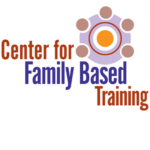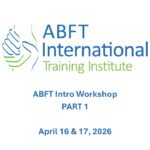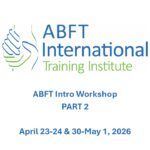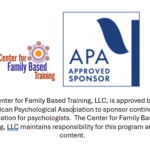TRAINING DATES:
Part One: April 16-17, 2026 (2-half days)
Part Two: April 23-24, 30-May 1, 2026 (4 half-days)
CHOOSE ONE TRACK:
Track 1: 9am-12:45pm Eastern Time***
or
Track 2: 1pm-4:45pm Eastern Time
***Track 1 is FULL and now CLOSED to new registrations.
4 spots remain in Track 2.
If you sign up for Track 2, but prefer Track 1, you can indicate you would like to be put on the waiting list for Track 1 in the notes section at checkout.
To be put on the waiting list for Track 1 without registering, email info@abftinternational.com.
Part One – Attachment-Based Family Therapy Introductory Workshop
Attachment-Based Family Therapy (ABFT) is an evidence‑based, manualized treatment model designed to address adolescent depression and suicide risk. Rooted in attachment theory and supported by extensive research, ABFT helps families rebuild trust, repair relational ruptures, and strengthen emotionally protective parent–child relationships. The therapy is structured around five clearly defined treatment tasks that guide clinicians in delivering this focused, emotionally engaged approach.
The Part One Introductory ABFT Workshop provides a comprehensive overview of ABFT. Through lectures and therapy demonstration videos, participants will explore the model’s theoretical foundations, core clinical strategies, and the experiential methods that make ABFT impactful. Faculty review how attachment principles, emotion regulation, and trauma‑informed concepts shape the delivery of this relational therapy. Attendees will also learn how the five treatment tasks serve as a roadmap for fostering meaningful change efficiently and effectively.
Part Two- Attachment-Based Family Therapy Introductory Workshop
Part Two of the Attachment-Based Family Therapy (ABFT) Introductory Workshop offers an applied, practice-focused extension of Part One or the Fundamentals of ABFT Online Self-Paced Course. Building on Part One, this training focuses on effectively implementing the five treatment tasks, working with emotional processes, integrating cultural context, managing resistance, eliciting the attachment narrative, preparing and guiding caregiver–child repair sessions, and supporting autonomy‑building conversations. Ideal for clinicians seeking practical, hands‑on experience with the ABFT framework. This live training deepens participants’ understanding of ABFT through therapy tape review, discussion of clinical challenges, and role plays that help therapists learn to apply the model with moderately cooperative families.
The training is equivalent to our Participants may enroll in Part One only, Part Two only (if they have previously attended Part One or completed the Fundamentals of ABFT Online Self-Paced Course), or the entire Two-Part Introductory Training.
Part One Attachment-Based Family Therapy Introductory Workshop
This is a beginner level course. The target audience for this training includes Case Workers, Counselors, Couple and Family Therapists, Mental Health Professionals, ER Physicians, Health Care Administrators, Frontline MH staff, Primary Care Physicians, Psychiatrists, Psychiatric Nurses, Psychologists, Psychotherapists, SAP Team members, and Social Workers.
Part Two Attachment-Based Family Therapy Introductory Workshop
This is an intermediate level course. The target audience for this training includes Counselors, Couples and Family Therapists, Mental Health Professionals Psychiatrists, Psychologists, Psychotherapists, and Social Workers who have previously completed the Part One ABFT Introductory Workshop or the Fundamentals of ABFT Online Self-Paced Course.
Both courses are live synchronous distance learning activities conducted in real time, allowing for simultaneous participation of participants and instructors from different locations.
Part 1 Program Objectives:
- Explain the theoretical foundation of ABFT.
- Discuss the empirical support for ABFT.
- Describe the five treatment task structure of the model.
- Explain how to engage family members in strengthening their relationship as the first goal of therapy.
- Identify strategies for helping youth explore and understand their attachment wounds and the impact it has on them.
- Discuss how to motivate youth to talk to parents about attachment injuries and traumas.
- Describe methods for increasing parental empathy for their child.
- Identify how to use in session enactments to enhance relational repair.
Part 2 Program Objectives:
- Identify the overall goal of each of the five treatment tasks
- List the three guiding principles for preparing for an ABFT session.
- Discuss when to build positive versus negative emotion in each task and the rationale for doing so.
- Explain how culture is discussed and explored with families in ABFT.
- Describe important components of the relational reframe task.
- Discuss how to manage client resistance when asking for a relational contract.
- Explain why exploring the mental health problem with the youth is important.
- Describe how to manage difficulty in eliciting the attachment narrative.
- Discuss how to join with caregivers to motivate them to try to support their child in a different way.
- Explain how to prepare caregivers for attachment repair sessions with their child.
- Describe the important components of the attachment repair session(s).
- Discuss the importance of the process of the promoting autonomy conversations in Task 5.
View approximate schedules for the training here:
ABFT Part 1 Schedule: Both Tracks
ABFT Part 2 Intro Webinar Schedule: Both Tracks
Part Two training involves small group role play. Participating in the role play is a requirement in order to receive a Certificate of Completion or CEs.
In general, one cannot miss more than approximately an hour of the training if they would like to receive a Certificate of Completion or CEs.
Registration Deadline: 14, 2026 5pm ET
Regular Registration
Part 1: $135
Part 2: $350
** Group Discount Available for Groups of 3 or more.
This live training will take place over Zoom. You will be emailed the Zoom link and relevant handouts a week before the first webinar will occur.
We do require cameras to be on during the training as we are trying to simulate an in-person training. Please do not hesitate to reach out to us regarding this requirement should you have questions or concerns.
Please let us know if you have any disability or other special needs so that we can ensure that your needs will be fully met (info@abftinternational.com or 267-270-2245). We will attempt to meet needs presented at the last minute, but 2 weeks notice will be appreciated

Suzanne Levy, Ph.D.
Suzanne Levy, Ph.D., is an internationally renowned licensed clinical psychologist and co-developer of ABFT. Previously she was the Executive Director of Strategic Initiatives and Training of the ABFT Training Program at Drexel University’s College of Nursing and Health Professions. Since 2007, Dr. Levy has been conducting ABFT training workshops and supervision for therapists nationally and internationally. She has presented regionally, nationally, and internationally on ABFT, emotion coaching, child and adolescent therapies, resilience, adolescent depression, adolescent development, and adolescent substance use.

Guy Diamond, Ph.D.
Guy Diamond, Ph.D., is Professor Emeritus at the University of Pennsylvania School of Medicine and formerly was Associate Professor at Drexel University in the College of Nursing and Health Professions. His primary work has been in the area of youth suicide prevention and treatment research. On the prevention side, he has created a program focused on training, screening and triage to be implemented in non-behavioral health settings. On the treatment side, he has focused on the development and testing of attachment-based family therapy (ABFT), especially for teens struggling with depression and suicide. ABFT has now been applied to children and young adults, LGBTQ youth and adults, and adopted in clinics all over the world where it is used as a transdiagnostic approach to patient mental health and ruptures in family attachment.
*Additional instructors may be added.
 Center for Family Based Training, LLC is Co-sponsoring this event.
Center for Family Based Training, LLC is Co-sponsoring this event.
This program is being offered for the following contact hours of continuing education:
Part One only: 6.5 hours
Part Two only: 13.25 hours
Full Two-Part training: 19.75 hours
 The Center for Family Based Training, LLC is approved by the American Psychological Association (APA) to sponsor Continuing Education for psychologists. The Center for Family Based Training, LLC maintains responsibility for this program and its content.
The Center for Family Based Training, LLC is approved by the American Psychological Association (APA) to sponsor Continuing Education for psychologists. The Center for Family Based Training, LLC maintains responsibility for this program and its content.
Pending approval:

Part One ABFT Introductory Workshop [course number], is approved by the Association of Social Work Boards (ASWB) Approved Continuing Education credit. ACE course approval period [dates]. Social workers completing this course receive 6.5 synchronous distance continuing education credits.
Part Two ABFT Introductory Workshop [course number], is approved by the Association of Social Work Boards (ASWB) Approved Continuing Education credit. ACE course approval period [dates]. Social workers completing this course receive 13.25 synchronous distance continuing education credits.
To receive continuing education credits, participants must attend the entire course and complete a course evaluation.
Certificates will be provided upon completion of the workshop and evaluation survey. Certificates are sent via email within 1 week of the workshop.
For any grievances or concerns relating to this co-sponsored workshop, please contact wayne@familybasedtraining.com from the Center for Family Based Training (CFBT). The CFBT will follow their grievance procedures and work together with ABFT to address any concerns. A response is typically provided within 15 days.
A $50 administrative fee will be charged for all refunds. Refund requests will be honored up to four business days before the start of the course and must be confirmed in writing. If cancellation occurs within three business days prior to the course, a refund will not be available. However, the full amount of tuition may be applied to a future course (i.e. you may transfer your registration to a future introductory workshop).
A $50 administrative fee will be charged for any returned checks due to insufficient funds.



